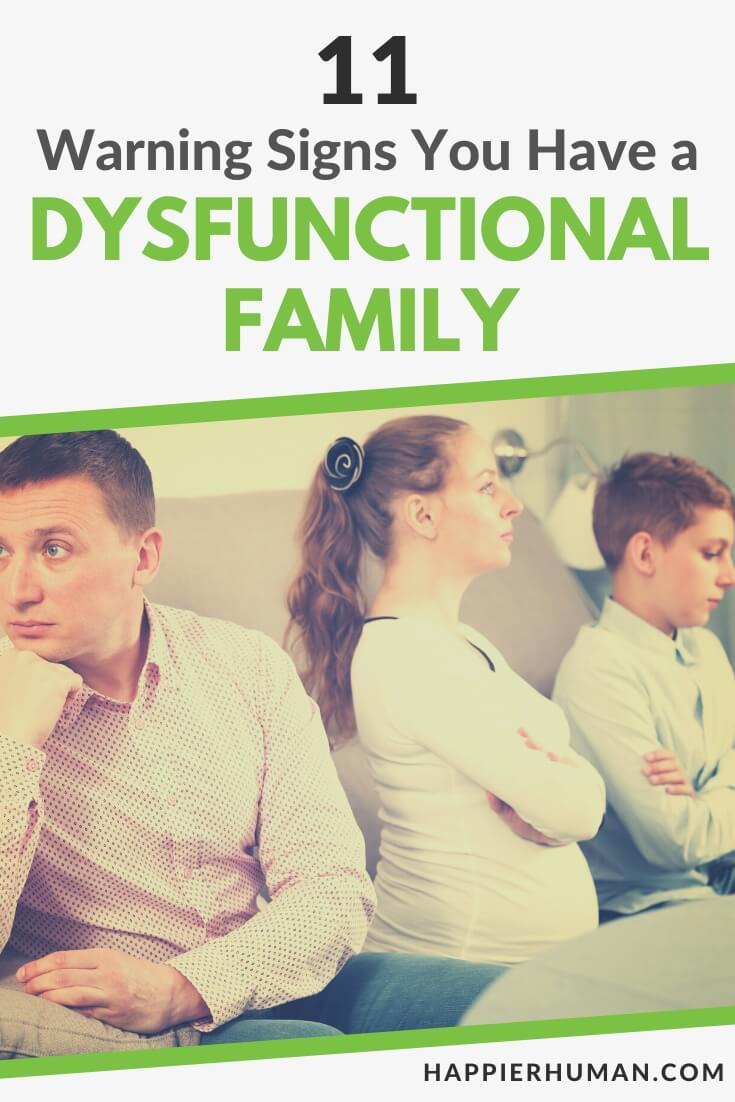I grew up in a dysfunctional family. To the outside world, we looked like the most normal, loving, and kind family on the block, but on the inside, we were rotten with dysfunctional behavior.
The worst part is, we didn’t really realize we were dysfunctional either. It took me some time to realize how our family unit wasn’t healthy and how it wasn’t working.
Only in hindsight did I see the signs of a dysfunctional family in my own nuclear family. Sometimes, you are so close to the fire, you can’t even feel the heat.
While inside that family situation, I didn’t see things were really wrong, and it was only when I began my own family years later that I finally began to see what type of family I wanted to build—and it wasn’t a dysfunctional one.
What Is a Dysfunctional Relationship?
A dysfunctional relationship is when you and the people you are in a relationship with don’t cooperate with each other. There is a lot of friction and conflict, and the general environment is toxic because you don’t fit together, and you aren’t safe for each other.
It’s like trying to fix your BMW with a Ford part, hoping to make it fit and work, but it just doesn’t. Sooner or later, your relationship heads for a complete breakdown.
Of course, there is no such thing as the perfect relationship, and sometimes you can borrow a part from a different vehicle to make yours run, but when that part makes the vehicle stop working altogether, it’s a dysfunctional part. A relationship that’s so toxic stops functioning effectively.
Impact and Ramifications of a Dysfunctional Relationship
A dysfunctional relationship is one where you and your partner argue and have conflicts that don’t get resolved for more than 20% of your time together.
Think of this in practical terms: If 20% of your day or 4.8 hours a day are spent arguing, it means that you and your partner spend an average of one whole day arguing each week. That’s 52 days of arguing a year—almost two whole months of solid arguing each year!
Clearly, this is a relationship that isn’t working.
When your relationship is filled with conflict and anxiety, it will affect you in other areas of your life and in other relationships in your life. Home is supposed to be a safe space where you can let down your guard, but when that safety is taken from you (or denied to you), it is very hard to trust others and ever relax.
Your stress and anxiety skyrockets. Soon, your other relationships are in trouble too, and you become an argumentative person who is hard to be around and difficult to work with.
… When It’s a Dysfunctional Family Relationship
The impact on your home relationship when there is a dysfunctional family relationship all the time is devastating to all who are involved. Your children suffer, you are in agony, your partner feels anguished, and even the neighbors struggle (they have to listen to you and your family argue and shout all day long).
Your family relationship is where your attachment to others begins. For you, it began in your home environment in your relationship with your primary caregivers.
When that relationship was dysfunctional, you learned an insecure attachment style, and if you’ve never addressed that issue, you will perpetuate it in your own home. Your family will suffer for the sins of your caregivers in a vicious cycle that never stops.
11 Warning Signs You Live in a Dysfunctional Family
So how do you know you are living in a dysfunctional family? What signs can tell you that your family relationships aren’t working and have become (or always were) toxic?
Here are a few signs and also a few ways to survive and thrive if you see these signs in your relationships at home.
1. A Lack of Communication
When communication falls away and you and your family members don’t and can’t communicate with each other, it leads to a fragmented and dysfunctional relationship.

When you and your family members don’t communicate, it means you engage in abusive and toxic behavior instead. Where you may have talked, you end up shouting at each other, still not hearing or resolving the conflict that caused the shouting anyway.
Survival Suggestion: To survive a relationship where communication doesn’t happen, set yourself a rule that you won’t engage with the other family members unless they communicate in acceptable ways. Of course, this is hard. But stick it out and don’t fall into broken ways of communication like your toxic family members do.
2. Disrespect
A family should show each other respect. When you no longer respect each other, you deny each other the right to speak up and be heard. Instead, you are ignored when others have no respect for you.
A lack of self-respect leads to being treated with disrespect, especially when those people have no idea of what respect looks like.
Survival Suggestion: Model the behavior you want to receive. Show others respect, even when they don’t “deserve” respect. Ultimately, respect is up to you. By having self-respect, you initiate the respect cycle.
3. You Resent Each Other
In dysfunctional families, resentment is the result of anger. There is a lot of anger: anger at each other, at yourselves, and at the world around these families.
Instead of dealing with that anger in a meaningful and constructive way, you end up transferring that anger to each other in an act of resentment. You end up blaming each other when it’s not even your fault.
Survival Suggestion: Focus when discussing matters. Don’t let the focus be on who’s to blame. Instead, focus on how to resolve things and move forward. The blame game doesn’t do anyone any good.
4. Work on Your Boundaries
Dysfunctional families are often in each other’s space all the time. It seems like everyone is so enmeshed in each other’s lives that there are no points where you stop and everyone else begins.
Boundaries are not “keep out” signs. Instead, they are signs to say what is acceptable to you and what isn’t. Boundaries help you maintain your needs and keep your spaces safe for you.
Survival Suggestion: Use journaling to identify your boundaries. You have probably forgotten or lost these boundaries through the years. Find them, clean up the signs, and help your family understand you need these boundaries and it’s not up to them to question your boundaries.
5. Living Past Each Other
Do you and your partner or your family members live past each other? Perhaps you have days where you don’t even speak. You are so busy living outside the home that you don’t even see each other or register what is going on in each other’s lives.
Avoidance and not sharing life is the polar opposite of having your family in your business all the time, and both these are examples of signs that your family is dysfunctional. There is no balance.
Survival Suggestion: Make family time a ritual. Families that are successful will have rituals or habits that keep them together when the world is busy ripping them apart. Make a few healthy habits, like Sunday lunch together, Friday movie nights, Wednesday date nights with your partner, or Monday pizza to start the week off a bit slower. Sharing hobbies can also help.
6. Lack of Intimacy
In a dysfunctional family, you and your partner may still be having frequent sex, but you may no longer be intimate. If that sounds like a contradiction, you’re right. While your bodies can work perfectly well together, your souls don’t match. Your hearts and minds are at war.

Physical intimacy is not sex. When your relationship is no longer able to be intimate, where you act with greater care and compassion toward each other’s bodies and lived experiences, you are no longer safe for each other, and you have entered a toxic relationship.
A dysfunctional relationship can recover, and intimacy can be regained, but this can never be forced. Booking a sleazy weekend away with loads of lube and some porn will not solve your intimacy issues, nor fix your broken relationship. If anything, it will only make matters worse.
Survival Suggestion: Help your relationship heal by working on trust before physical intimacy. This means you and your partner spend quality time together, talking, listening, and earning the right to touch. Touching each other’s bodies isn’t a right that comes with being in a relationship. You earn their consent by showing your partner you care, respect them, and you can comfort them with your presence.
7. You Become Codependent
Most dysfunctional families split apart like shards of a broken vase. But some dysfunctional units cling together for dear life.
You may become completely codependent on your partner (or vice versa), instead of being an “us” that works together in unison, you are all about that one person (the dominant partner) and everyone else’s lives revolve around that person.
We often see this with families where one child is a sports star, and the whole family has to plan their lives and activities around that child.
Likewise, when one parent is the one who shines, the others fade to the background, living dull lives that are merely supporting acts for the “star” of the show.
Survival Suggestion: Rediscover who you are and what matters to you. Journaling and engaging in a self-development course like Julia Cameron’s The Artist’s Way is a great way to do this. When you have discovered what makes you feel alive, you need to include more of this in your life. Don’t drag your partner with you on this journey, and even if they are supportive, it’s yours to walk.
8. There Is Abuse
One of the clearest signs that a family is dysfunctional is when there is abuse. The problem is, not all of us have the same definition of what abuse is.
In my view, abuse is when another person has lost all respect for you and believes they can behave in any way toward you that makes them feel more powerful.
Examples of family abuse are not only a slap or a raised voice. Nasty and painful comments, unsupportive opinions, and a lack of time spent together all become forms of abuse.
When abuse is a sign of dysfunction in the family, there are usually other signs (disrespect, resentment, and power plays) that accompany it too. It’s usually not the first sign of things no longer working.
Survival Suggestion: Abuse is never acceptable. No matter the reason behind abuse, it can’t be explained away or justified. Survive the abuse by understanding that abuse is about the other person. They are the ones with the problems, which they are taking out on you, but you have the power to walk away or choose not to accept the abusive behavior.
9. It’s All About Power
A family isn’t a kingdom. It’s not a space where one person rules and the others have to grovel before them. Yet some families are so driven by a desire to rule each other that there is constant conflict that upsets any normal interactions.
When the family relationship is about a balance of power, who is in charge, and who gets to rule, there will be dysfunction and disaster.
Survival Suggestion: Evaluate what you consider to be equal for everyone. Learn to share power and to redistribute the “rulership” among all members of the family so there is no instance of “my way or the highway.”
10. Play Tension Out
When there is already conflict and an imbalance of power in the relationship, tension will run high. In normal relationships, both partners will want to address their tension and unwind it.

However, when the relationship is dysfunctional, these partners will keep on building tension instead of diffusing it. There is such fear that the relationship will fail, neither partner will consider that living with such tension is perhaps worse than a relationship ending.
Survival Suggestion: Identify the tension points in the relationship and start the process of communication so you and your partner can discuss the tension points. Don’t fall into the blame game or dominance trap. You are not there to find out who is to blame. You are both guilty, and you also both want to fix things.
11. Betrayal
A final and deadly sign that a relationship is in serious trouble and totally dysfunctional is when the partners no longer turn to each other for support and sharing secrets.
In a dysfunctional relationship, when one partner shares their secrets outside the relationship with a friend, lover, or confidant (except when that person is a therapist and they are going for therapy), they have broken the last shred of trust in the relationship.
Survival Suggestion: When you are being betrayed, consider whether the relationship can be saved or if you have reached the edge of the abyss and it’s time to move onto separate paths. If you feel there is still hope, you and your partner both need professional help to make this work.
If you are the one who has betrayed your partner, it may be a sign you can’t save the relationship and trying to do so may simply be a way of toying with their feelings. Let your partner go and give them the right to a happy life. Don’t let your disrespect ruin them.
Final Thoughts on Signs of a Dysfunctional Family
No relationship is perfect, and no family is ideal. But even when your relationship is flawed, it can still be successfully functional when there is communication, respect, care, and effort by all parties involved.
A relationship that shows signs of being a dysfunctional family is one where the relationship no longer works, where there is more conflict than joy and support, and more abuse than respect and commitment.
Knowing what kind of relationship your family bond has become is important to help you assess whether it’s a relationship you can work on and heal or if it has become a toxic environment where you will never thrive. Learn how to become a happier person with our guide on what makes people happy.


